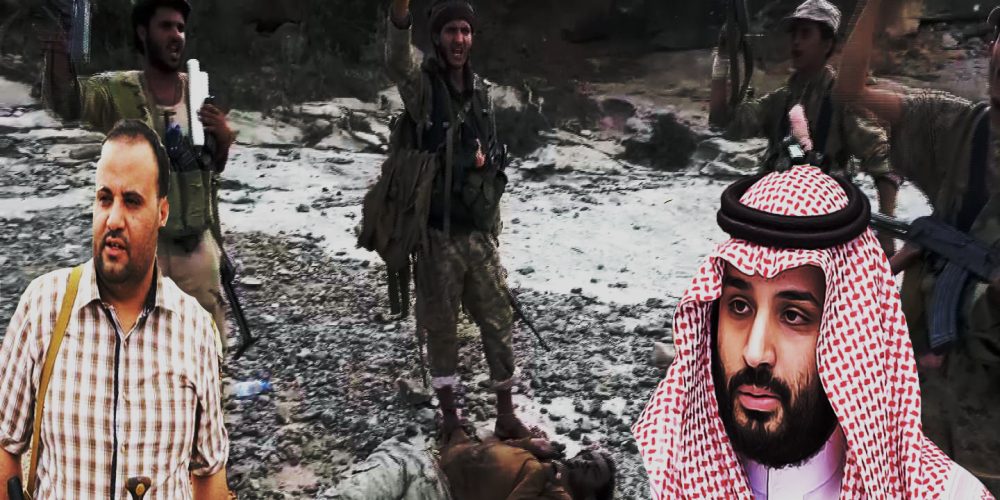How Oil and Yemen Threaten bin Salman’s Future?
YemenExtra
Y.A
Bloomberg spoke of the challenges facing Saudi Arabia, both politically and economically, as Saudi Crown Prince Mohammed bin Salman made another step toward the throne.
Saudi Arabia, more than a year after Bin Salman’s vision of the economic vision (Vision 2030), continues to face many difficulties in implementing reforms within the objectives of the Supreme Leader’s plan within the Kingdom. More skeptical “of the possibility of achieving some of the” medium-term goals “, with the continuing crisis of decline in oil prices, and record the price of a barrel of crude oil about $ 48 this year, down 15%, a price« much lower than the level needed by the Kingdom to balance its budget . The figure Saudi Arabia aspires to reach this goal will be around $ 70 a barrel, according to estimates by the head of the Middle East and North Africa Research Center at the Chartered Foundation, based in Abu Dhabi.
The reason is that low oil revenues deprive the Saudi government of the financial resources needed to achieve fiscal balance in the budget figures by 2020, while seeking to stimulate economic growth, in order to ease the burdens of its citizens on the cost rationalization.
As the Saudi government has known over the past two years, it has reduced public spending, imposed some taxes, and reduced government subsidies for some commodities, such as tobacco, soft drinks and fuel, and announced its intention to sell shares of Aramco, the oil giant, $ 53 billion to stimulate private sector businesses over four years.
According to Bloomberg, the Saudi authorities’ taking “deeper” economic steps would test Saudi Arabia’s resolve to pursue reforms. Saudi Arabia’s approach “runs counter to the wheel of history”, which assumes that economic diversification schemes rely heavily on policies Pre-oil price slump, not according to Bloomberg.
Low oil revenues deny the government the resources required to achieve balance
Negative indicators of Saudi Arabia’s financial and economic performance The International Monetary Fund (IMF) is slashing its forecast for the growth of the Saudi economy this year to “almost zero”, as well as financial experts at Citigroup, Standard Chartered and EFG Hermes said that Saudi Arabia was in a period of recession and recession for the first time since the global financial crisis in 2009. In a recent report, the International Monetary Fund (IMF) reduced its growth forecast for the kingdom this year from 0.4 percent to 0.
1 percent, Domestic non-oil to Saudi Arabia by 1.7 percent compared to the previous forecast of 2 percent. Growth in non-oil economic sectors is not enough to balance the negative picture of the growth of oil-dependent economic sectors. According to economist EFG Hermes, Mohammed Abu Pasha, the economic landscape in Saudi Arabia does not notice «many signs of qualitative growth or qualitative, in reference to the dominance of oil on the structure of the economy of the country. “Credit growth does not mean anything,” he said.
“The rewards for project activity (government-run) are weak, not to mention double data on cement consumption figures within the country and the disparities in estimates between one source and another.
“If Riyadh does not succeed in achieving an economic surge, it will not be able to accelerate the pace of fiscal reforms, which are likely to remain slower than in 2016,” said Monica Malik, chief economist at the bank’s Abu Dhabi Commercial Bank.
Malik considered the prospects for the Saudi economy to record slight growth rates and the persistent budget deficit “still high”, which is a “very serious” sign.
In this context, the agency drew attention to Saudi Arabia’s decision to reintroduce the system of bonuses and bonuses granted to public servants in April, as a reflection of the good financial performance in the period before the decision, and “more than expected”. “It is likely that the Kingdom will delay the next package of a series of government cuts” to later this year, or early next year, it said.
Riyadh is considering adjusting the pace of cutting public spending in the next phase, in order to achieve economic growth in the foreseeable future, according to Bloomberg. And from the perspective of the director of the Center for Economic Research at the Gulf Center.
Source :Website

